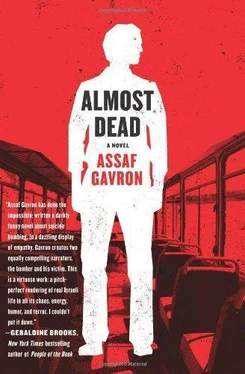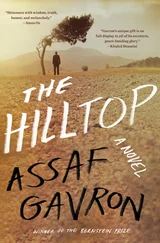‘I know nothing’s going to happen,’ he said, ‘but if it does…If you want, I can also send a message to someone, like, if I…you know.’
‘No,’ I said reflexively. Then I thought: maybe I should send a message to someone? Maybe I should get my will written? You never know. I thought that if there was anyone I would leave anything to, it would have to be Duchi. Despite everything.
And then I thought again. Damn — what the hell am I doing, on a bus, on the way to work, worrying about my will? How did I get here? On the back of the bus in front there was a picture of one of those red-jacketed guardsmen in London. It said: ‘Going abroad? Take your mobile!’ On the radio, a man who was driving behind the bus that was blown up in Wadi Ara told Rafi Reshef, ‘I’m optimistic, optimistic, optimistic, optimistic.’ We were getting to the busier part of Dizengoff Street, where the towers of the Centre loom and the city crush grows denser. A phone rang and someone answered. I got my little notebook out — since my Palm stopped working I’m back in the Middle Ages — and wrote: Check again how much rent house New Zealand. Talk w/Duchi about it.
‘You from Jerusalem?’ I said to the guy. ‘Me too, originally.’ But I saw he was thinking about other things. His expression was serious. Later I’d think about how people sometimes have premonitions. How we found all kinds of clues and hints that Danny Lam left before he was killed, like the poem he wrote a month before, and how soldiers who die are always supposed to say goodbye in a special way in their last phone call. How people always said things in the final days; how they’d had a feeling that something was going to happen . On the other hand, everybody says these things all the time. You just pay attention to the ones who actually die. I myself had a sign that I was about to die. One time I saw these birds flying in the dark. I thought: birds flying in the dark, weird, it must be a sign…and yet I’m still alive. Even now. Even after the Little No. 5, after Shaar Hagai, after Emek Refa’im.
After Fahmi.
‘Stop being a fool,’ I said to Giora Guetta. ‘Don’t think about it.’
He smiled. I stood up, waved goodbye to him and got off the Little No. 5 without a word. On my way out I didn’t look at the dark guy, the suicide bomber, again. I think I didn’t look at him because I didn’t believe he was a terrorist, but maybe I didn’t look at him because I didn’t want to embarrass him.
I walked into the mall at the base of the Dizengoff Centre through Gate 3. With all the bombs and precautions, the entrance to the Centre looks like the gate to an army camp: barriers, guards and metal detectors that always, always beep. The guards never check the source of the beep so why do they run the detector over us? Just to send magnetic waves through our bones?
Every day I’m treated differently entering the mall. Sometimes they might ask me to show my wallet or phone, other times they just pass the detector over me, or let me through and only then stop me, as if I’d somehow gone through too quickly, or looked suspiciously relieved. One time, immediately after a big bomb, they started asking for ID cards and added another guard near the elevators to the offices. This checkpoint was about seven metres past the first one. Two days later they got rid of the second guard. Another day passed and the ID card wasn’t necessary. After the next big bomb you needed it again.
So even when they let me pass and then stopped and groped me seven metres after someone else had; even when I had to take my bag off my back, unzip it, take my wallet out, take the ID card out, open it in front of them and watch them not even glance at it — I might as well have stuck a picture of Arafat in there: they’d have waved me through anyway — I decided to let them get on with their job. Not because I think there’s no alternative, but because I no longer have the strength to object. What good would it do if I complained or refused to show my ID? I see people arguing and I can understand, but it never helps them. It just slows them down. It’s like footballers arguing with the referee after he gives a penalty — was there ever a player in the history of football who changed a ref’s mind?
That day, there was a blood donation unit at the gate. It’s important to donate. They say there’s not enough blood in the hospitals because of all the bombs. But I didn’t have time. I went up to the office. I didn’t hear the explosion. Everybody else did, people down at street level, people up in our office on the twenty-third floor. Bombs are something you hear. They’re loud. But I was in the elevator and didn’t hear it. Not that the boom made such an impression at first. There are booms all the time: sonic aircraft booms, building-site booms, all the accidents and bangs and crashes of a city. So everyone in the office was looking calm. I popped my head into all the rooms on the way to my own room and said hello, as I did every morning, and people smiled and said good morning, as they did every morning. In my room I said hello to Ron and Ronen, and Ron said, ‘You hear the boom?’
‘What boom?’
It took a few minutes until we realised that there had been a suicide bomb and that it had happened in the centre of Tel Aviv. We turned on the TV in the kitchen and saw the map with the little flame-thing that shows the location of the bomb, and saw it was up the road, at the south end of Dizengoff Street, near the Habima Theatre, and they were saying it was probably a bus.
Everyone in the office was watching the TV. Those who hadn’t arrived yet wouldn’t arrive for a while because the roads were blocked. According to Ynet there were ten Israelis killed and one suicide bomber. The result: 10–1. The Jews lose again, or at any rate it’s a scoreline that’s going to need quite a bit of a positive gloss.
Soon I was busy answering the phone and telling everyone I was alive. ‘No, they didn’t get me yet,’ I told the callers. After a few calls, I started answering the phone with, ‘This is Croc and I’m alive, who wants to know?’ I talked to people I hadn’t talked to for years.
‘Lucky there are bombs once in a while,’ I told them, ‘at least we get to talk.’
I started work: I had to talk to our Swiss client, Ivan, work out what he required; I made calls and wrote emails and documents, and at some point Ron said, ‘No. 5 minibus — you use that thing, don’t you?’ I lifted my eyes from the screen.
‘What?’
‘No. 5 minibus?’
‘I call it the Little No. 5. What about it?’
‘The bomb. It was a No. 5 minibus that was bombed. Your bus, isn’t it?’
‘Really?’
My first thought was: fuck, how will I get to work from now on? Those fuckers hit every possible means of transportation. Am I going to have to take cabs now? Buy another car? Too expensive…
I entered Ynet again and read the update. Every passenger on the minibus killed. But still it didn’t seem like mine. Somehow it seemed it couldn’t be the right time or place. There were dozens of minibuses en route at any given time. ‘Yeah, I go on one every day,’ I was telling everyone nonchalantly. ‘Unbelievable. The bomber could have been on the same No. 5 I was on. Who knows?’
Only then did I remember the dark guy and his suit bag, and the old lady who suspected him, whom I’d told not to worry. And the other guy who asked me to send some unspecified message to his girlfriend. This is crazy, I thought, I have to get hold of this guy, and then the phone rang.
‘Croc, I’m alive,’ I answered.
‘Uh huh,’ said Jimmy. ‘Why alive?’
‘Why not?’
‘Listen, next week there’s a meeting in Brussels, it’s important, it’s with…’ Here he mentioned the name of a large Belgian telecoms company. His accent was terrible. ‘You coming with me?’
Читать дальше












